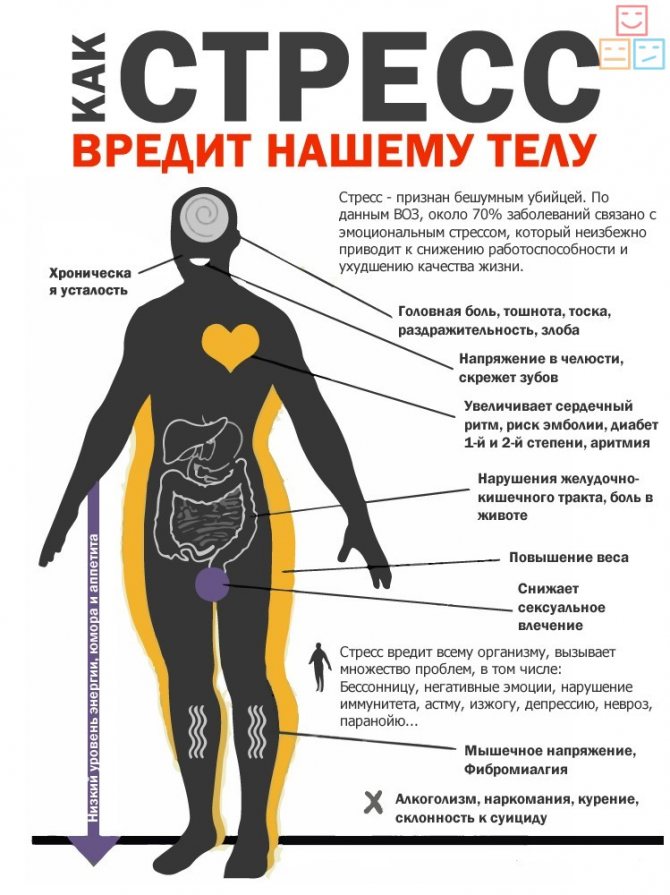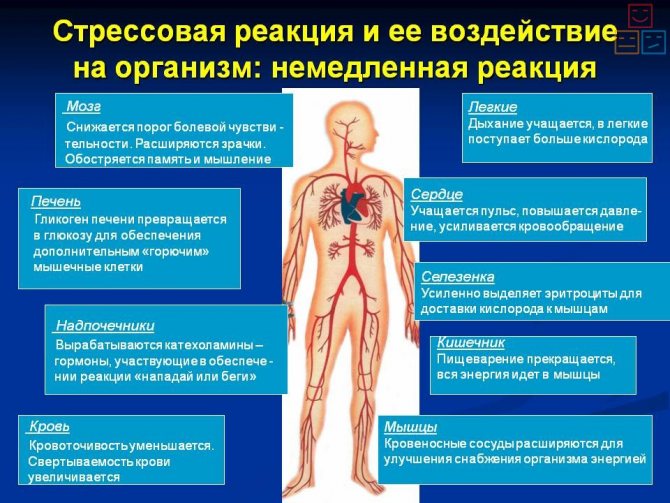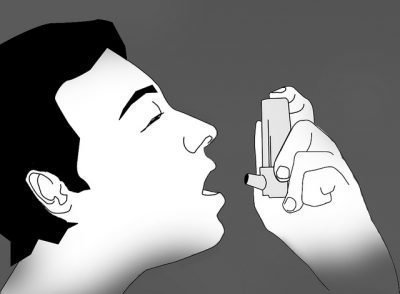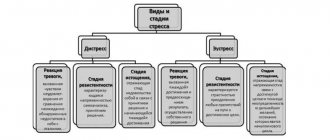.
During the high speed of life and constant lack of time, a person experiences psychological discomfort. Under the influence of prolonged nervous conditions, the body ceases to independently cope with its consequences, and harm is caused to health. There is even such a science (psychosomatics), which indicates the relationship between the state of the soul and the body. But not everyone is able to understand what stress leads to.
Nervous tension causes serious damage to health
Why is stress dangerous?
When a person is in a stressful situation for a long time, a number of changes occur in his body. This affects his well-being, emotional state, behavior, relationships with loved ones, and performance.
There is a widespread belief that all diseases arise from nerves. For people who are wondering whether it is possible to get sick due to stress, the answer is a clear yes. Not all diseases and not in all cases are caused by nervous tension, but this factor contributes to the development of disorders of various systems in the body.
In addition to physical problems, stress can cause emotional and cognitive problems. Being under the influence of stress factors, a person becomes less balanced. He may behave aggressively and irritably with others or, conversely, become more passive and apathetic, subject to depressive moods.
The brain function of a person who has been under stress for a long time is also susceptible to detrimental effects. This may cause absent-mindedness, memory problems, and it becomes more difficult to concentrate.
Taken together, poor physical condition, emotional instability and cognitive impairment affect all areas of human activity. Performance decreases and training results become less effective. As a result, problems may arise at work, or the person achieves less than he could have achieved without being under the influence of stress.
Difficulty controlling emotions can lead to conflicts with others. Failures at work and a tense environment at home become new stress factors that have a negative impact on the state, emotions and thought processes. The result is a vicious cycle where the stress response causes more stress.
The factors that trigger a stress response are not the same for all people. How the body reacts to a situation depends on perception. For example, a person who suffers from claustrophobia will be terrified if they find themselves in a confined space. For people without such a phobia, such a situation will be neutral, and therefore will not cause any emotions.
The causes and consequences of stress may be different, but the body will react in the same way under such conditions.

Weakening of the immune system
Chronic stress also has a strong link to poor immunity. While a person suffers from stress, the level of cortisol in the body also increases, which makes changes in the immune system's response. In addition, it has the ability to suppress the production of “good” prostaglandins, which play an important role in maintaining immune function. Stress negatively affects the immune system, thereby exposing the body to an increased risk of infections, colds and flu. It can also increase your chance of developing other diseases such as diabetes and heart disease.
Elevated cortisol levels can affect growth, digestion, and the reproductive system. To reduce the frequency of stress, it is better to practice some yoga poses, meditation, massage, aromatherapy. All this will have a positive effect on the immune system.
What happens in the human body during stress?
The human body reacts to a stress factor as if it were a danger. It doesn’t matter that there is no threat to life at this moment, the body will behave as if there is a mortal threat. In such a situation, the body mobilizes all its strength to cope with it. If we draw parallels with a threat to life, then there are 2 response options: run away or fight. In both cases, concentration, reaction speed and muscle tone are required.
Therefore, in a stressful situation, adrenaline and cortisol are released into the blood. They contribute to increased blood pressure and increased heart rate. Breathing also becomes more frequent. Peripheral vision weakens, the gaze focuses more on the object of danger.
Blood sugar levels rise, which helps release energy that may be needed for active muscle work. Digestive functions weaken, sweating increases. Psychomotor reactions become faster, the nervous system is activated. The release of glucocorticoids, hormones produced by the adrenal glands, suppresses immune responses.
In the short term, stress can be beneficial because it mobilizes physical and mental processes, which allows you to make decisions and act faster and more effectively. But the body cannot constantly be in an activated state, therefore, when the influence of stress lasts for a long time, negative changes begin. The cardiovascular system suffers, the immune system cannot cope with its tasks.
Stress can manifest itself differently in women and men. Women tend to be more emotional, so they may become more irritable and cry more often. Stress in men may manifest itself more as health problems, as they often prefer to bottle up their feelings.

Deterioration of heart function

Heart pain is another negative effect of stress on the body. Experiencing excessive stress over a long period is bad for a person's heart.
This condition can create the appearance of high blood pressure, irregular heartbeat or heart disease. During times of stress, the body releases hormones that damage the heart muscles. As a result, it will increase the heart rate and also block the blood vessels, thereby causing high blood pressure. If your blood pressure rises frequently and over a long period of time, your risk of having a heart attack or stroke increases.
Another side effect of repeated stress is that it becomes an inflammatory factor in the circulatory system, especially the coronary arteries. This, in turn, puts you at high risk of heart attack.
Negative effects of stress
Problems with physical and psychological health, poor relationships with loved ones, unfulfilled careers - this is what stress leads to.
Physiological effects of stress
Being in a stressful situation for a long time can lead to pathologies of the cardiovascular system: tachycardia, hypertension, and an increased risk of heart attack and stroke. There have been cases where after suffering severe stress overnight, a rash appeared on the skin; Digestive system disorders often appear. The protective functions of the immune system are reduced, so a person may experience frequent colds and infections.
Psychotherapy
For chronic stress, it is advisable to use the help of a psychotherapist. What is included in psychotherapy treatment?
- Gestalt therapy. The body is weakened after nervous experiences; during therapy, the patient is helped to concentrate on all aspects of his condition. Stress leaves a mark on a person - muscle tension, posture, facial expressions, and gait change. In the process of work, a person becomes aware of himself and changes.
- Cognitive behavioral therapy. As a result of work, a person changes his attitude towards the problem, looks for an alternative and consolidates the new state in everyday life.
How to recover from stress?
In order to cope with a stressful situation, you need to solve the problem that causes it. To reduce the risk of illness from nerves, you should lead a healthy lifestyle: sleep well, watch your diet.
In a stressful situation, people can often abuse alcohol or overeat. Instead of promoting bad habits, if you cannot cope on your own, it is better to consult a psychologist. It can help not only with the problem you are dealing with, but also teach you how to respond to similar situations in the future in order to reduce the likely negative consequences.
General relaxation is facilitated by yoga, meditation, and breathing practices. Any physical activity reduces the level of emotional stress.
If nervous tension is too strong, you can use sedatives of herbal origin, which can be bought at any pharmacy. Anxiolytics and tranquilizers require a doctor's prescription.
Dear readers! We strongly recommend that you consult a doctor before taking medications or self-medicating. There are contraindications.
source
Should you deal with stress?
If we take into account that stress is only the body’s response to external factors, a kind of defensive reaction, then it becomes clear that it is pointless to fight this phenomenon. It is also unlikely that we will be able to avoid it (troubles, one way or another, arise on our path in life). So what to do? Learn to react correctly to stressful situations.
Firstly, so that any slightest trouble does not unsettle you, your body must be prepared for stress. People say: “It is not the one who hits first who is strong, but the one who can withstand!” Therefore, pay attention to your health, engage in prevention, carry out hardening procedures and keep your body in good shape.
Secondly, learn to adequately perceive your problems. Any trouble that seems significant at first glance loses its relevance over time. There is no need to worry about what has already happened, much less worry in advance about what might happen in the future.
Thirdly, learn to relieve nervous tension. To help you: laughter, sex, relaxation, physical activity. By the way, try to devote only half an hour of free time to sports 2-3 times a week. As practice shows, within a month the feeling of anxiety will go away, and it will be replaced by cheerfulness and good mood.
Related posts:
- How to treat schizoaffective disorders Schizoaffective disorder (schizoaffective psychosis) is an illness in which there are two interrelated components: ...
- Features of the course of schizophrenia in men and women Schizophrenia is a disease belonging to the group of endogenous psychoses, since its causes...
- Effective treatment for panic attacks A panic attack is a sudden attack of anxiety and overwhelming fear, accompanied by...
- Panic disorder in women Panic disorders include a range of symptoms, ranging from panic attacks -...
Consequences of long-term stress
Increased nervousness, aggression and apathy are the most common symptoms of prolonged stress. Prolonged stress on the psyche leads to the following consequences: a person’s physiology, moral state, and social relationships suffer.

Apathy is one of the manifestations of prolonged stress
The consequences of stress depend on the stress tolerance of the individual, the type of occupation and status of the person. Long-term and short-term stress can change the behavior and character of a man, woman, teenager or child.
Stressful state
The consequences of this condition appear after prolonged stress on the nervous system. The central nervous system functions in two processes - relaxation and a state of excitation. Violation of one process entails a number of symptoms: irritability, headaches, insomnia, absent-mindedness and aggression. The consequences of severe stress are chronic changes in behavior, treated with tranquilizers, sedatives and deep psychoanalysis.
What does stress lead to? The reaction of the human body is unpredictable. The symptoms of the consequences depend on the person’s life, his environment and the factors that trigger stress. Why stress is dangerous:
- irreversible changes in the victim’s personality;
- pathologies of internal organs;
- development of mental disorders;
- adaptation disorder;
- destruction of the relationship between the stressed person and his environment.
Stress and its consequences depend on the frequency of stressors (events, people, memories that frighten a person). Fear is normal. Short-term emotional protection creates minimal harm to the body.
Constant tension is dangerous for mental and physiological health: the more often a person is in fear, the harder it is to get rid of the root cause of stress.
Causes of stress
Negative emotions arise against the backdrop of difficult life situations. The reasons for a difficult moral situation can be hereditary factors, hormonal changes in the body, physical changes, psycho-emotional stress, disruption of the daily routine, and relationship problems.
It will not be possible to avoid the causes of stress in the modern world, but every person can develop stress resistance.
The body's protective reactions can be regulated through breathing exercises, sports, yoga or other activities that require concentration and strength.
Reaction to stress
The reaction to stress is the consequences that have to be dealt with. Frequent panic attacks or insomnia create the preconditions for the development of a mental disorder. The frequency of human diseases directly depends on the frequency of reactions to stress. A weakened body cannot resist even the slightest threat: infectious or viral diseases. Symptoms of stress:
- cardiopalmus;
- headache;
- confusion;
- memory loss;
- increased sweating;
- pain in the chest and heart;
- abdominal cramps;
- chills;
- speech disorder.
Health effects of stress
Stress and its consequences are dependent concepts: severe trauma takes longer to resolve. A tense state disrupts the rhythm of life. It is difficult for the patient to navigate what is happening, to recover from severe stress without feeling devastated. The victim’s internal organs also suffer from mental stress: the cardiovascular system, stomach and intestines, endocrine system.
The human body weakens, and irritability gradually turns into apathy. People with stress from work or problems in their personal lives develop indifference to loved ones and the world around them. Due to constant stress, sleep is disturbed: the brain does not relax, confusion appears, and the severity of reactions weakens.
Psychosomatic diseases
The psychosomatic consequences of a severe stress state appear against the background of weakened immunity. Reduced activity and lack of appetite deplete the body: reduced immunity cannot resist diseases. Consequences of severe emotional stress:
- stroke;
- stomach and intestinal ulcers;
- chronic insomnia;
- decreased concentration;
- migraine;
- depression;
- sexual dysfunction;
- asthma;
- atherosclerosis.
The pathologies that arise depend on the state of the human body before the stress experienced. Increased anxiety, aggression and neuroses are accompanied by inflammation of chronic diseases. Eczema and dermatitis occur in people who cannot cope with anxious thoughts.
Stress is dangerous due to mental illnesses, such as split personality, penetrating trauma syndrome. For sick people, reality changes and adapts to their fears.
Children who have experienced domestic violence suffer from attention deficit disorder: the child exhibits symptoms of a fictitious disease. Over time, this syndrome develops into severe chronic diseases. A stressful state reduces professional activity. During home treatment and taking sedatives, the conductivity of brain neurons decreases. Memory is impaired, work ability decreases, and concentration is lost.

Asthma may be psychosomatic in nature
How to protect yourself
In order not to encounter any of the consequences listed above, it is worth knowing about the prevention of stress. The following ways will help you stay healthy and avoid depression.
Get enough sleep . This advice is tritely simple, but if you accustom yourself to a routine and go to bed and get up at the same time, your body will thank you. The normal amount of sleep for an adult is 7-8 hours. Also, in the evening you should not watch TV or use a smartphone. The best activity before bed is reading.
Exercise . When receiving physical activity, our body produces endorphins - hormones of happiness. To do this, you just need to find a sport you like, because you don’t have to torture yourself with long cardio workouts.
If you pull yourself together and start dealing with stress in a timely manner, then you can completely do without medications and specialists
Do not put off problems, but solve them immediately . This will help you avoid piling up things to do and be less tired. To make this easier for you, it is advisable to use a diary.
Meet friends . Regular communication can distract you from problems and cheer you up. Also, with the help of friends' support, it will be easier for you to overcome difficulties.

Sports and proper nutrition are the key to health
Eat properly
This point is also important, because from healthy food the body gets everything it needs, which helps it cope with anxiety faster.
Think positively
Optimism allows you not to lose heart and look for successful ways to overcome difficulties. You can also add affirmations - repeating positive statements with which you will encourage, praise and set yourself up for success.
Meditate
This will help you calm down and find effective solutions to problems. To meditate, you just need to relax your whole body, turn off your thoughts, and listen to relaxing music.
Don't forget about hobbies
Your hobbies will allow you to relax and gain strength after experiences, and recharge with new energy.
Plan your day clearly
If you have a routine and schedule, you will be much less tired and overwhelmed.
Chronic fatigue and chronic stress
In psychology, there are three types of human behavioral reactions to stress. The first reaction is conventionally called “foot on the gas” - the person is angry and constantly agitated. Under the pressure of circumstances, he literally boils, only negative emotions arise in him. The second state - “foot on the brake” - is characterized by isolation and withdrawal of the victim from the outside world. He closes himself, hides behind a mask of indifference. The last and most dangerous reaction to stress is “feet on both pedals.” The person is tense and constrained, it is difficult for him to pull away, but he is not able to throw out his emotions.
Chronic stress occurs against the background of any reaction of the body: the decisive factor is the duration of the symptoms of a serious condition. The body is weakened by violent emotions and attempts to escape consciousness. Long-term stress leads to complete emotional burnout.

Some people become lethargic under stress
Symptoms of burnout
The consequences of emotional instability, burnout, are accompanied by special symptoms. Signs of emotional burnout are divided into 3 groups:
- Cognitive. The victim exhibits memory problems. He only focuses on negative situations. Constant anxious thoughts accompany emotional burnout. Changing the victim's mindset is the most difficult task. The anxiety does not go away during the day, and at night the anxiety results in nightmares. The person feels tired, insensitive, lethargic.
- Emotional. The consequences of burnout are expressed in the acquired character traits of the victim: he is capricious, demanding, and quick-tempered for any reason. A person suffering from stress is overcome by feelings of loneliness and isolation. Depression and sadness are the main symptoms of burnout.
- Behavioral. The behavioral consequences of burnout are more common in adolescents and children. The victim is undernourished or overeating, hides from other people, and suffers from insomnia. The victim of stress cannot and does not want to complete the assigned tasks.
Combating the effects of chronic stress
Comprehensive exercises will help get rid of severe nervous tension: a person undergoes emotional therapy and performs physical exercises. Complex activities lead a person to inner harmony. To treat chronic stress use:
- Yoga. Yoga classes allow you to concentrate your attention, focus your thoughts and let go of anxiety. Daily yoga practice has a beneficial effect on the physical condition of the body.
- Breathing exercises. Breathing techniques can be used at home, at work and even on public transport. Holding your breath and breathing calmly will ensure the supply of oxygen to the brain. Through breathing, a tense body relaxes and internal processes are normalized.
- Relaxation techniques. Massage and acupuncture will improve the functioning of the digestive system, blood circulation and muscle tone. Relieving tension will help you get rid of the effects of work stress.
- Lifestyle organization. Normalization of nutrition and a healthy lifestyle changes thinking. If a person takes care of himself, his stress level decreases.
To combat stress, it is not necessary to attend paid classes.
A person who has suffered emotional burnout can do home exercises. Morning jogging and a balanced diet will improve internal metabolic processes.
Quiet activities such as reading, knitting, art therapy are useful to improve morale. Concentrating energy and attention on one process has a beneficial effect on people with anxious thoughts.
Effects on brain tissue

Stress can negatively impact the brain, which is one of the common health effects. Any type of stress can actually make a person unable to use the cognitive techniques that are known to control anxiety and fear. Research published in 2020 shows that stress has the ability to affect areas of the brain that regulate self-control and emotions. It also causes problems related to learning and concentration. Chronic stress may be associated with regional decreases in brain tissue volume.









